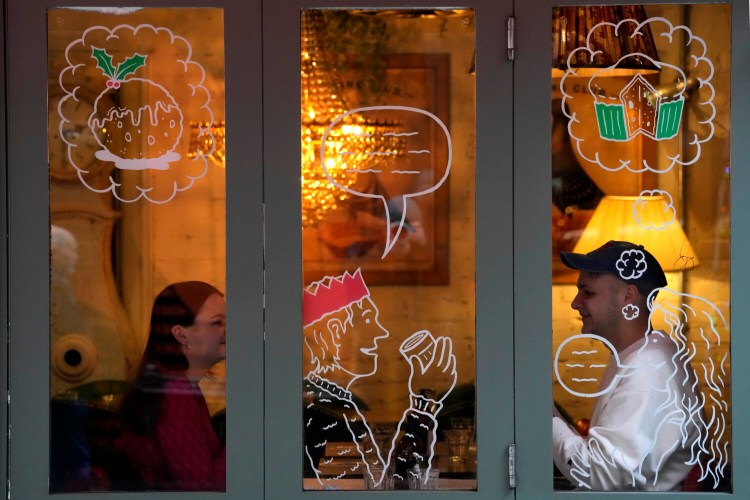LONDON — Britain announced 1 billion pounds ($1.3 billion) in grants and other aid to help the hospitality industry survive the onslaught of the omicron variant of COVID-19, bowing to days of pressure from pubs, restaurants and other businesses that complain public health warnings have torpedoed the vital Christmas season.
Businesses in the hospitality and leisure sectors in England will be eligible for one-time grants of up to 6,000 pounds ($7,954) each. An additional 100 million pounds ($133 million) will be given to local governments to support businesses in their areas hit by the sudden spike in COVID-19 infections driven by the highly transmissible new variant.
While industry groups welcomed the funding, many said it was too narrowly focused and more assistance would be needed if the surge in infections continues or the government imposes more restrictions.
Prime Minister Boris Johnson announced Tuesday that he wouldn’t impose any new coronavirus restrictions before Christmas – but new measures could be coming after the holiday if omicron continues to surge.
“We continue to monitor omicron very closely and if the situation deteriorates we will be ready to take action if needed,” he said in a video statement.
Pubs and restaurants have reported a wave of cancellations during the crucial Christmas season as people shun public events and workers are forced to self-isolate, leaving venues short of staff. Many theaters and museums also have closed their doors.
“With the surge in omicron cases, people are rightly exercising more caution as they go about their lives, which is impacting our hospitality, leisure and cultural sectors at what is typically the busiest time of the year,’’ Johnson said in a statement. “That’s why we’re taking immediate action.”
The plunge in business came after England’s chief medical officer told the public to limit their social contacts and prioritize the events they most want to attend this holiday season. The message came as COVID-19 infections surged to the highest levels ever, raising concerns that hospitals and other emergency services may be overwhelmed.
Business groups including the British Chamber of Commerce, the Federation of Small Business and UKHospitality have demanded government help.
“The decline in trade at this critical period for the hospitality sector has been catastrophic, so we are extremely grateful that the chancellor has recognized this and come forward with a generous package of support,” said Kate Nicholls, chief executive of UKHospitality. “This will help businesses to stay afloat and preserve jobs.”
While several organizations welcomed the government aid, some big interest groups said so much damage had already been done that the support offered Tuesday was inadequate.
“The open/close strategy is crucifying businesses,” Michael Kill, chief executive of the Night Time Industries Association. “Every pound of help is much needed. But this package is far too little and borders on the insulting.”
Others pointed to major gaps in the package. The aviation industry and companies in the food and drink supply chain, for example, won’t be eligible for help, said Stephen Phipson, chief executive of Make UK, an industry group for manufacturers.
“Hospitality is not the only sector being severely impacted,” he said. “Government must now consider targeted support for the aerospace sector in particular, which has taken one step forward and now two steps back as travel has once again subsided.”
The government’s scientific advisers have recommended further restrictions to slow the spread of omicron, but Johnson has been reluctant to order a lockdown in part because of the cost to the public purse. The U.K. has already spent more than 350 billion pounds ($464 billion) fighting the pandemic, pushing public debt to 96 percent of gross domestic product, the highest since 1963.
Instead, Johnson is betting vaccines will be his savior, urging everyone to get booster shots.
Many governments in Europe and the U.S. are confronting similar dilemmas over how hard to come down in the face of omicron, which scientists say spreads more easily than other coronavirus strains, including delta, which itself led to surges in many parts of the world. Early evidence suggests omicron may also produce less serious illness – though experts caution it is too soon to say – and that it could better evade vaccine protection.
Even if it is milder, the new variant could still overwhelm health systems because of the sheer number of infections. Confirmed coronavirus cases in the U.K. have surged by 60 percent in a week as omicron overtook delta as the dominant variant.
Businesses argue that the uncertainty alone is wreaking havoc. Nathan Godley of restaurant supplier Premier Seafoods told the BBC that he needed to be able to plan for the future.
“Fish doesn’t just go from the boat to the restaurant,” he said. “There’s quite a few of us in this supply chain in between, and we all need to know what is happening.”
Comments are not available on this story.
Send questions/comments to the editors.


